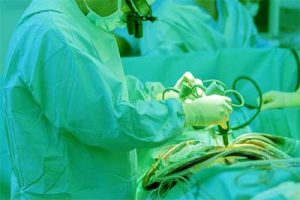- Home
- Editorial
- News
- Practice Guidelines
- Anesthesiology Guidelines
- Cancer Guidelines
- Cardiac Sciences Guidelines
- Critical Care Guidelines
- Dentistry Guidelines
- Dermatology Guidelines
- Diabetes and Endo Guidelines
- Diagnostics Guidelines
- ENT Guidelines
- Featured Practice Guidelines
- Gastroenterology Guidelines
- Geriatrics Guidelines
- Medicine Guidelines
- Nephrology Guidelines
- Neurosciences Guidelines
- Obs and Gynae Guidelines
- Ophthalmology Guidelines
- Orthopaedics Guidelines
- Paediatrics Guidelines
- Psychiatry Guidelines
- Pulmonology Guidelines
- Radiology Guidelines
- Surgery Guidelines
- Urology Guidelines
Risk of infection higher for patients with obesity after bypass surgery

Edmonton--Patients with obesity have a higher risk of infection within 30 days after receiving heart bypass surgery, according to a series of studies conducted by University of Alberta researchers at the Faculty of Rehabilitation Medicine.
The team analyzed data from 56,722 patients in the provincial registry to examine associations between body mass index (BMI) and various outcomes following coronary artery bypass grafting (CABG) surgery and percutaneous coronary intervention (PCI), also known as coronary angioplasty.
"Compared to patients with normal BMI, we found that patients with BMI greater than 30 were 1.9 times more likely to report infections after bypass surgery," said Tasuku Terada, a rehabilitation science postdoctoral research fellow who recently presented the series of studies at the Canadian Obesity Summit. "A better understanding is needed in order to improve clinical outcomes for patients with obesity and heart disease."
In addition, another study in the series published in the Canadian Journal of Cardiology found that 88 per cent of patients who received PCI were classified as obese, compared to 55 per cent of the patients who received CABG. PCI is a non-surgical procedure that opens up narrowed arteries in the heart due to plaque buildup. The physician places a small stent to keep the artery open and help to prevent re-narrowing.
Terada says the risk of infection following CABG may explain why patients with obesity are more likely to receive PCI.
"We need to look at why there is more infection following CABG and whether more patients with obesity are receiving PCI because they should be, or because the risk is a factor in the decision made by health-care professionals," he says.
Postsurgical infection means an increase in the length of stay at the hospital for patients, resulting in increased medical costs and use of resources. Knowing the risks and potential outcomes can help health-care providers and patients make more informed choices on treatment and better use of resources.
Mary Forhan, obesity expert and assistant professor in occupational therapy at the Faculty of Rehabilitation Medicine, believes that further investigation will help researchers develop tools to help decrease the risk of infection, and to ensure that patients are receiving proper care.
"For example, are the chest binders that are used after surgery the right size and are they working the right way?" she says. "Our team is currently looking at the re-design of postsurgical chest binders so that patients have better outcomes following bypass surgery."

Disclaimer: This site is primarily intended for healthcare professionals. Any content/information on this website does not replace the advice of medical and/or health professionals and should not be construed as medical/diagnostic advice/endorsement or prescription. Use of this site is subject to our terms of use, privacy policy, advertisement policy. © 2020 Minerva Medical Treatment Pvt Ltd